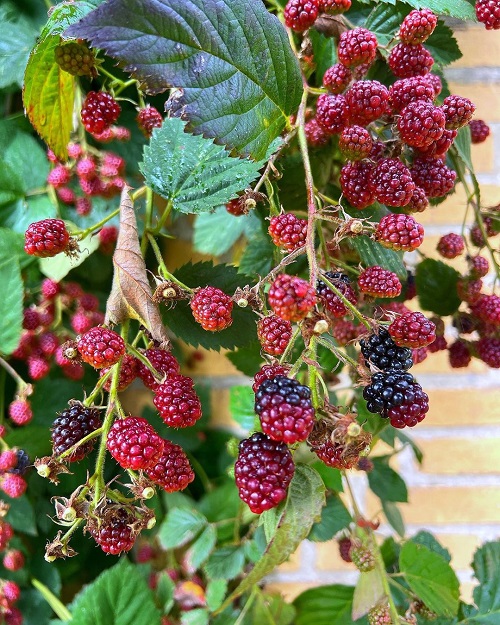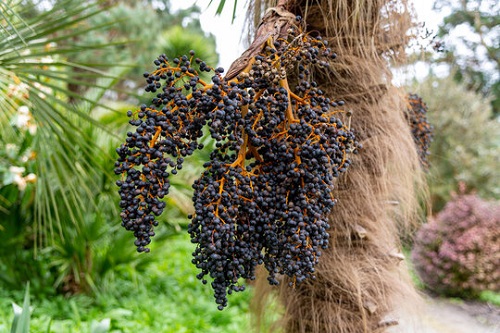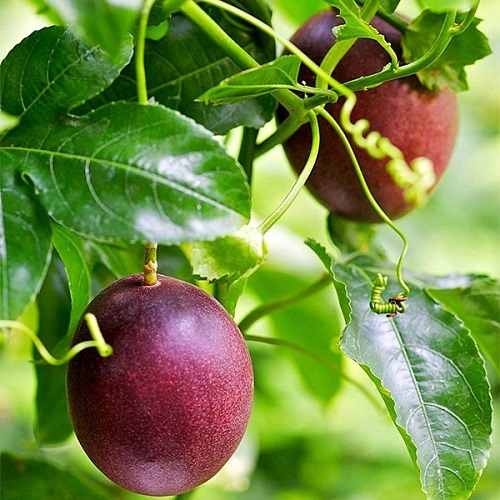Here are some of the Best Purple Fruits that will surely add a lot of drama and color to the garden while giving you a tasty harvest!
Amongst all colors, purple is the one that symbolizes royalty. But when it comes to the world of gardening, purple represents beauty and health. Here are some Best Purple Fruits you must grow!
Find the Best Blue Fruits here
Science Behind Purple Fruits
Indeed, fruits bearing a shade of purple are a healthy addition to the palate, owing to their high content of anthocyanin pigments that stave off metabolic disorders, aging, seasonal flu, and even cancer.
Not just that, fruits that flaunt the bold purple shade are better adaptable to the environment, thanks to their heightened abilities to fight off intruding predators while attracting pollinators at the same time.
Look at some Gorgeous Purple Foliage Plants here
Best Purple Fruits
1. Blackberries

Botanical Name: Rubus
This delicious Purple Fruit can be a great addition to your breakfast. Blackberries are packed with polyphenols and anthocyanins—the two antioxidants that help prevent everything from cancer to diabetes, heart ailments, and aging.
Blackberries are perennials that prefer well-drained, loamy soil and benefit from occasional composting to enrich organic matter. Their preferred soil pH is acidic to neutral (pH 5.5- 7.0).
Learn about Growing Blackberries in Pots here
2. Passionfruit
Botanical Name: Passiflora edulis
A tropical Purple Fruit prized for its scrumptious fruits bearing health-promoting polyphenols, the passionfruit flaunts a yellowish purple succulent flesh interspersed with dark-colored crispy seeds.
These fruits are rich in a certain polyphenol known as piceatannol, which contains anti-aging properties. Passion fruit adores the full sun but thrives best in partial shade. The soil should be rich and well-draining.
3. Mangosteen

Botanical Name: Garcinia mangostana
The mangosteen tree has been a staple in tropical zones for the sweet aromatic purple fruits it bears. This Purple Fruit is loaded with folate, an essential vitamin B that boosts the formation of blood cells. Not just that, it has an array of antioxidants with anticancer and anti-inflammatory benefits.
Mangosteens do not tolerate the direct sun too well; hence planting them on a site that gets indirect/ filtered sunlight is your best bet. The one requirement that mangosteen just cannot do without is rich organic soil maintained at a slightly acidic pH- the kind of fertile soil found along rivers.
Get the Best Mangosteen Care Guide here
4. Acai Berries

Botanical Name: Euterpe oleracea
A popular addition to smoothie bowls, morning drinks, and frozen yogurt, the acai berry is a tiny Purple Fruit with an exhaustive content of anthocyanins. This explains their medicinal uses in combating inflammation, high cholesterol, hyperglycemia, and skin ailments.
When growing them, consider using a cactus mix or palm potting mix. Ideally, a well-draining area rich in organic soil at a slightly acidic pH should be the best choice.
5. Purple Star Apple

Botanical Name: Chrysophyllum cainito
The star apple is a peculiar tree to have in the garden—its rounded fruits are reminiscent of eggplants which, when cut open, sport a star-like pattern and soft flesh that oozes milky juice.
Site selection is key to growing this Purple Fruit. These plants are best adapted to warm tropical weather and must be protected from strong winds. They enjoy anything from full sun to shade and require regular watering until the roots establish.
These trees tend to get large, so pruning is necessary for a compact size. Also, selecting a site that irrigates well but doesn’t flood easily is your best bet.
6. Elderberries
Botanical Name: Sambucus
Full of vitamin C, fiber, and folate, elderberries have renowned immune-boosting properties that lend themselves to healing symptoms of cold and flu. Plus, they easily blend with various juice, jam, and jelly recipes with their distinctive tangy sweet taste.
This Purple Fruit grows best in moist, fertile soil maintained at acidic pH (5.5-6.5). It is a highly adaptable plant and does equally well in sun and shade. Fertilizing with a 10-10-10 NPK feed just before spring is a good idea to boost fruiting.
Do Elderberries Grow in Arkansas? Find here
7. Dragon Fruit

Botanical Name: Selenicereus undatus
With their gorgeous red-purple hue and exotic shape, dragon fruits stand out amidst the seasonal regulars in your garden. Bearing a texture similar to kiwi, these tropical fruits are rich in magnesium, vitamin C, fiber, and many antioxidants.
This Purple Fruit plant, being tropical, enjoys a mix of high temperatures and humidity. Well-draining soil is another necessity, as waterlogged sites lead to root rot.
Want to Grow Dragon Fruits? Learn here
8. Plum
Botanical Name: Prunus domestica
The purple plum will uplift your garden with countless health benefits for heart diseases, anxiety, constipation relief, and an antioxidant-rich nature.
Growing this Purple Fruit is easy. Make sure it gets 6–8 hours of direct sunlight. You can relish it as a raw fruit, in salads, smoothies, and with yogurt.
9. Concord Grapes
Botanical Name: Vitis labrusca ‘Concord’
Concord grapes are woody perennials that enjoy the direct sun and are cherished for their fruits and foliage. They are a delicacy with a deep-sweet flavor and a tangy twist enjoyed worldwide as fresh fruits, juices, jellies, jams, grape wines, and grape soft drinks.
This Purple Fruit tree lives for nearly 35-40 years and provides savory grapes within 1-3 years.
Do you Know You Can Grow Grapes in Containers? Click here
10. Java Plum
Botanical Name: Syzygium cumini
Java Plums are evergreen tropical trees, also known as Malabar plum, Jamun, and Black plum. The fruit is excellent for preventing infections and contains a low glycemic content, making it effective in maintaining blood sugar.
This Purple Fruit loves to bask in the sunlight and prefers well-drained soils such as deep loam soil. Enjoy these as fruits, salads, juices, and smoothies.
11. Black Currant
Botanical Name: Ribes nigrum
Black currants are rich in antioxidants, vitamin C, and anthocyanins, keeping your immune system healthy while you enjoy the strongly acidic and tart taste.
This Purple Fruit loves direct sun and well-drained but moisture-retentive soil. It tastes great in jams, muffins, pies, bread, juice, smoothies, and alcohol; you can also relish it raw.
12. Fig
Botanical Name: Ficus carica
With a sweet flavor and a hint of berry, figs can be consumed raw and are rich in calcium and potassium to improve bone density and keep you strong.
Figs grow well in well-drained soil, such as sandy soil, with some organic matter like mulch. This Purple Fruit does not survive in frost, so ensure that it is always grown in regions where the temperature does not drop below 15°F (-9.44°C).
Find the Best Fiddle Leaf Fig Varieties here
13. Blueberry

Botanical Name: Vaccinium
These blue-purple berries have the highest antioxidant capacity among all fruits and vegetables and protect your cells from free radicals. You can grow blueberries in the full sun and acidic soil (pH of 4.5 to 4.8).
This Purple Fruit adds an appeal to the garden and can be relished in smoothies, pancakes, ice creams, yogurts, jams, or even raw, owing to their slightly acidic sweet taste.
Learn about Growing Blueberries in Pots here
14. Tommy Atkins Mango
Botanical Name: Mangifera ‘Tommy Atkins’
This is surely one of the best Purple Fruit you can grow in the garden. When the tree gets full of purple mangoes, it makes for a great sight!
Like other mangoes, it needs a well-draining growing medium and plenty of sunlight to grow and fruit well. You can also grow it in large containers of 18-20 inches on a sunny balcony or a patio.
Find the Best Mango Varieties here
Final Thoughts
There is no doubt that every Purple Fruit on this list can be a great addition to the garden. You can easily grow most of them in pots, too! These fruits also top the list of healthy additions to breakfasts and juice blends.









